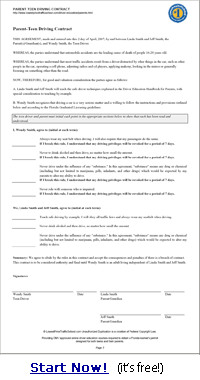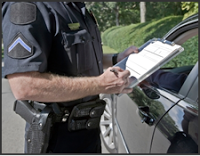Monthly Archives: June 2007

Take a Contract Out with your Teenager
June 15, 2007
The statistics have been repeated often enough – car accidents account as the biggest killer of teenagers in the country. The recent article in The Tribune states that parents could be unwittingly contributing to the cause of these accidents. How? It’s easy enough to figure out. Not that many parents have strict guidelines for their teens in regards to driving.
Parents – it is your job to communicate the rules of the road and by that, the article meant those rules that you don’t learn in a driver’s education course. With teenagers, you cannot assume anything. You may think they understand that texting and driving at the same time is dangerous. However, you have to actually vocalize it in order for them to recognize and remember it.
The same thought applies to a number of different scenarios. That is why the recent article in The Tribune states that parents should have a contract with their teenage driver. If there is a special set of delineated rules that both parents and teenagers should follow, there is less chance of failure. The key to success is for parents to work with their teens to create these rules together. Parents – you may be pleasantly surprised at how many teenagers “get it”. They just have to practice “it”.
While many parents and teens know how the basic rules should be, it doesn’t hurt to review them again. For instance, not that many teenagers may realize that night driving is particularly hazardous to a fairly new driver. What they should know is that seat belts are a must. Teenagers should not even put the car in gear unless each and every person was wearing a seat belt, even the friends in the back seat.
For the ultimate contract with your teenager, you as the parent must promise to adhere to the same rules. In other words, you have to be a good driving role model for your teenager. Of course, most adults are set in their ways, so it will actually take more effort on your part to keep your act together while driving on the road. Can you keep both eyes on the road and avoid using your cell phone while driving? Will you be able to adhere to all driving laws and avoid those California rolls through stop signs and blatant red light running?
As parents, you should not wait to convey all of these driving rules of the road. Start talking about safe driving practices with your kids before they get old enough to drive. And practice what you preach. That is the bottom line to maintain driving legitimacy in your teen’s eyes.

Project Note Home in Wyoming Should Keep Teens on the Straight and Narrow
June 7, 2007
The state of Wyoming has implemented a great new plan called “Project Note Home.” It seems that new teenage drivers tend to not share the fact that they receive traffic tickets with their parents. Shocking, isn’t it? In fact, parents are pretty much clueless until the next insurance bill comes along. However, with “Project Note Home,” any traffic infraction gets communicated to the parents.
Keeping parents in the loop about their teen’s driving record is a smart move for the state. Too often, teens have found out ways to pay for their tickets without their parents finding out about it. These teens are not being held accountable for their actions. What are a few bucks in fines compared to having their driving privileges suspended? Well, with this new program, copies of the traffic violation are being sent home to the parents. Teenagers will now have no way to hide their driving violations.
No longer will parents be shocked to find their teen’s auto insurance bill going up several hundred dollars. Now, they will know exactly why – their teenagers are not practicing safe driving practices. You can bet that a lot more teenagers will experience suspended driving privileges as a result of “Project Note Home.”
There is a side benefit to this new program as well. It could very well save the lives of many teenager drivers. It’s a proven fact that the biggest death toll in car accidents every year fall within the fifteen to twenty year old range. Teenagers are inexperienced. They have not come across every driving situation experience yet. With that inexperience come potential problems.
By being held accountable for every infraction while behind the wheel of a car, teenagers will soon learn to shape up their habits. Speeding is one of the biggest violations on the road along with not wearing a seat belt. Both of these infractions can kill. By alerting parents to the fact that their teenagers are not engaging in safe driving behaviors, this will open a dialogue between the parent and the teen. They will be forced to talk about the situation and perhaps, a lesson or two will be learned.
